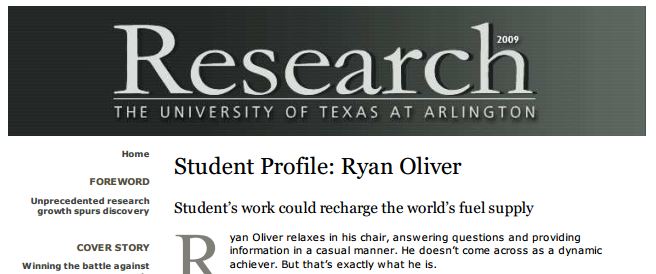The following is a reproduction of a feature article in the UTA Research Magazine.
Student Profile: Ryan Oliver
Student’s work could recharge the world’s fuel supply
Ryan Oliver relaxes in his chair, answering questions and providinginformation in a casual manner. He doesn’t come across as a dynamicachiever. But that’s exactly what he is.
Oliver recently received his master’s degree in industrial engineering from
UT Arlington a year after graduating summa cum laude with his bachelor’s degree. As a graduate student, he worked with professors John Priest in industrial engineering and Brian Dennis in mechanical engineering to develop a microreactor that converts cottonseed and similar agricultural products into biodiesel and, with modifications, lignite coal into crude oil.
“Dr. Priest has a talent in fitting people with the right projects,” Oliver says. “This project was extremely challenging, but fulfilling.” The team worked to
perfect a process of laminating polymers into microfluidic devices, which became the topic of Oliver’s master’s thesis.
“This project has the potential of recharging the world’s fuel supply,” Priest says. “Not only will it work with things beyond edible crops such as corn, it will also do it quicker than current methods, using less energy and producing a higher quality product at a lower cost.”
The ability to use cottonseed has drawn the attention of the Texas Department of
Agriculture, which is providing developmental funding for the process. Other plants are being considered for their oil-producing abilities, including jatropha, a hardy native of Central America now found in India, Africa and parts of the United States. Usually considered a weed, the non-edible plant is resistant to drought and pests and produces seeds containing up to 40 percent jatropha oil.

To develop the microprocessing system, the team had to design a method to manufacture and assemble thousands of microreactors easily and with the same operational capabilities. This involved the repeated creation and testing of dies, stamping procedures, heating and cooling times for the polymers and modifying the assembly process. A typical biodiesel processing plant using this system will incorporate more than 10,000 microreactors but still be small enough to transport in a pickup truck.
“One of the joys of conducting research is that point when, after testing, testing, testing and hitting a wall, a crack suddenly develops and you can see definite progress,” Oliver says. “It’s a great sense of discovery, a wonderful payoff for all your determination.”
Determination and discovery come naturally to Oliver. While in high school, he started and ran his own Web development company that employed 15 people. While studying for his bachelor’s degree, he found time to participate in internships at Dallas/Fort Worth International Airport and Coca-Cola, serve as president of the Institute of Industrial Engineers (IIE) student chapter, be a member of the engineering honor societies Tau Beta Pi and Alpha Pi Mu and present a paper on plastics manufacturing simulations at an IIE conference.
He also received a G.T. Stevens Scholarship and was named Outstanding Senior in
the Industrial and Manufacturing Systems Engineering Department. And he worked on a project that could change the course of energy independence in
the United States and the world.
– Roger Tuttle






